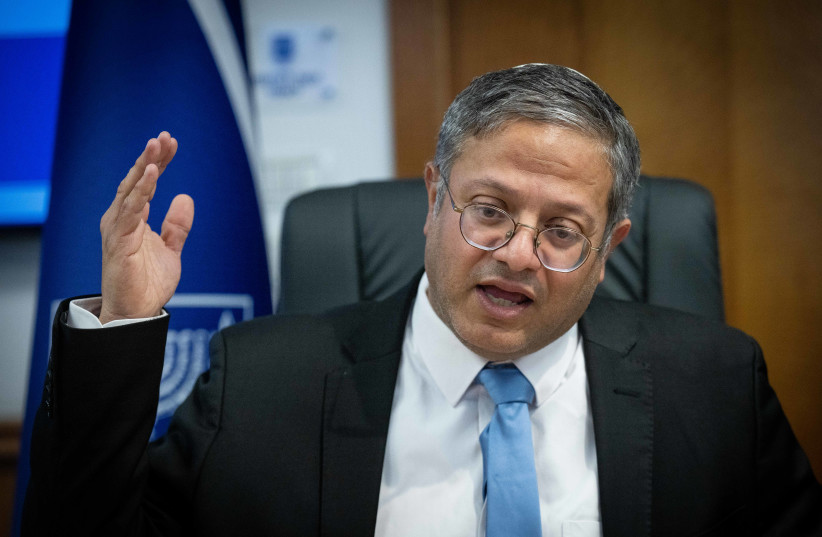Israel has been described as the closest democracy to the West in the Middle East. The leaders who established Israel in 1948 – alongside those who initiated the notion of the State of Israel, such as Theodor Herzl – represented the secular and liberal wing of the Jewish people.
Secularism and liberalism are the pillars of Western democracies that are supposed to represent equality between citizens by guaranteeing their rights, regardless of ethnicity or religion. Whether this can be said of Israel is a matter for debate, especially in light of the numerous interviews Prime Minister Benjamin Netanyahu has given to Western media, in which he has unconvincingly attempted to tackle those concerns.
It is no wonder that, since the formation of the current government, alarms have been raised about some coalition members, foremost among them National Security Minister Itamar Ben-Gvir. These concerns were not raised by outsiders but by the Israelis themselves, which makes the argument against him valuable. That is why Netanyahu must take action to secure his coalition from the minister.
This month, former senior police officials issued warnings against Ben-Gvir and called on Netanyahu to fire him, which depicts how internal security issues are transitioning to an unstable scenario.
Ben-Gvir claimed that the so-called “national guard” which the government agreed to establish by allocating $277 million will confront the violence in Arab society. What happened was the reverse, despite his disagreements with Police Commissioner, Yaakov “Kobi” Shabtai. We saw the shutting down of the crime prevention unit in the police structure of Arab communities. We saw Ben-Gvir appoint a new adviser, Ben-Zion “Bentzi” Gopstein, who in 2019 was indicted on charges of incitement to terrorism, violence and racism. No further elaboration is needed to judge whether he is the appropriate personality to lead Israeli “national security.” Discrimination, especially against Arabs, is evident in his policies.

Clearly, Netanyahu is keen on preserving his coalition to avoid another election that might not guarantee his political future. Of course, a significant counterargument is how he will sustain his coalition if it does not meet the needs and demands of the Israeli nation.
No wonder the protests against judicial reforms added to the problem of crime in the Arab community that the government is facing. It is now up to Netanyahu to substitute Ben-Gvir (with his consent) with another coalition member, in exchange for something valuable that is perhaps acceptable to Otzma Yehudit and its supporters. Alternatively, there should be concerted efforts to convince Ben-Gvir to change his representation of Israeli democracy and end his discriminatory policies.
The rising crime rates, murders in Israel's Arab sector
Crime numbers in the Arab community are the true witnesses in this case. The casualties in Arab society in Israel have almost doubled in the past decade (from 58 in 2015 to 111 in 2022) and have already reached 104 as of the middle of June 2023. Thus the number of casualties in 2023 will likely exceed those of 2022 by the end of the year. This drastic increase in the crime rate clearly illustrates the deeply rooted hatred in Arab Israelis and how the Israeli government’s lack of a tangible solution is fueling such crimes.
The increase in crimes across Arab cities, towns and villages – such as Nazareth, Kafr Kara and Al-Khawaled – puts internal security on edge. The problem here is not specific to Arab locations; it extends to Jewish areas and sometimes even to other countries where they vacation.
Netanyahu must be aware of the urgency of solving this problem in order to pursue a route to peace with Arab countries. If the Israeli government cannot handle the problems of the Arabs inside Israel, how will it manage to achieve peace with the Palestinians in the West Bank and Gaza? And how will other Arab countries deal with the Israelis if they are so clearly aware of the discrimination against Arab Israelis? Securing jobs or seats in the Knesset is simply not enough. Living a secure existence should be the most fundamental right of all citizens in any country.
In recent governmental meetings, Netanyahu decided to indulge the Shin Bet to battle crime in Arab society. His idea was to take a collective approach through different agencies to stop the bloodshed among Arabs. Although this might be the right approach theoretically, in practice it could cause a backlash, since it creates the need for a consensus among Arabs on this approach.
Adding to that, when we see Netanyahu’s government approve a new ministerial committee on the Arab community with 18 ministers and among them only one Arab representative – Hassan Towafra, who heads the Social Equality Ministry’s minority economic development – it does not signal that the government is heading toward a feasible solution.
It is understood that the coalition does not contain any Arab parties and that’s why they are not part of the ministerial committee. However, any attempts to solve the issue of the Arab community must include Arab Israelis significantly in the process – either directly or indirectly through their representatives – to better understand the problems faced by Arab families, how to address them and the best course of action to counter the crimes against them.
The writer is a senior researcher in Israel Affairs at Trends Research and Advisory.
